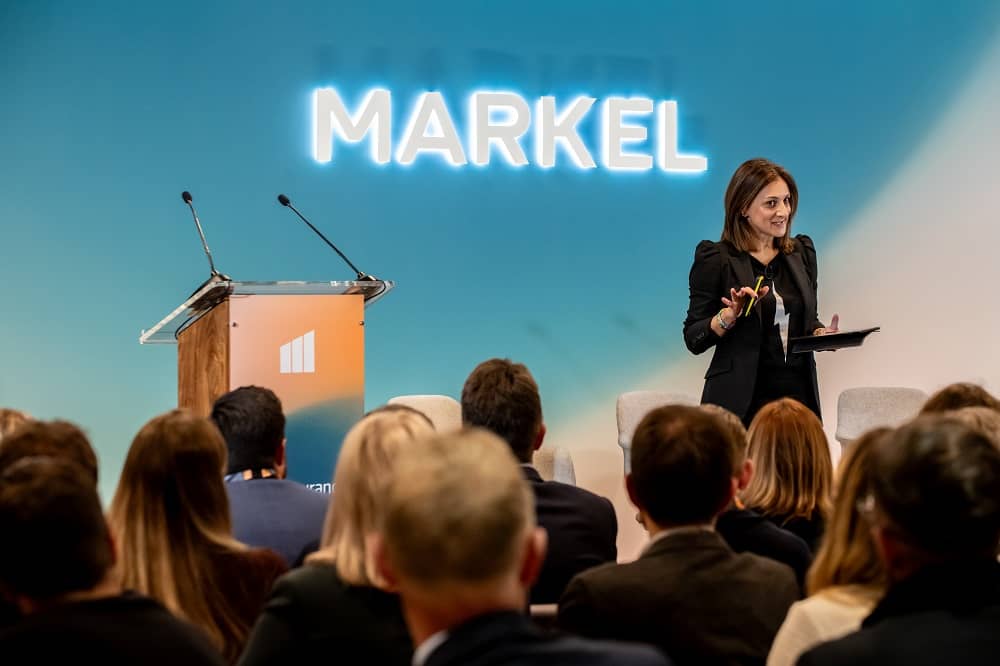The rise of cyber-attacks means businesses of all sizes are at risk. Having specialist insurance can help ensure they recover quickly should they be affected.
The threat of cyber-attacks is a growing concern for businesses of all types, with around half having experienced an attack in the last 12 months, according to the government’s Cyber Security Breaches Survey 2024.
Watch the MarkelTech event panel discussion, which explores the UK tech landscape and the opportunity for brokers.
Phishing is most popular
The most commonly reported incidents are phishing attacks, cited by 84% of businesses; criminals impersonating someone else from the organisation (35%); and devices being targeted with malware (17%). “There’s not a day that goes by when we don’t hear about an attack, so there is definitely concern from businesses,” says Jo Sykes, divisional director broker at Markel.
Recent examples include Transport for London, which found itself unable to process Oyster card or contactless payments following an incident which also exposed the data of 5,000 customers, and the department store Harvey Nichols, which also suffered a data breach.
As well as being unable to trade and significant reputational damage, a cyber-attack can also have legal consequences. “A cyber incident can lead to breach of contract and fines from the Information Commissioner’s Office,” says Sam Rix, technology and cyber underwriting manager at Markel. “It's a very interconnected area, and because tech companies have such reliance on data, digital processes and operations in the cloud, it’s a rapidly evolving space.”
Cyber specific cover
Mark Lowther, head of financial lines at Markel UK, says many brokers are concerned their clients only have generalist commercial insurance policies rather than specific cyber cover. “A lot of the concerns I hear are around whether coverage is appropriate,” he says. “They might not have the correct heads of cover or the right level of cover.”
It’s also important to ensure that any insurance policy covers subsidiaries operating in different areas, adds Rix. “Companies often open subsidiaries in places like India and Poland, where there are some very good software developers, and everyone is interested in the US market,” he says. “But when you’re expanding into new territories, there are evolving data risks and different rules and regulations that need to be factored in.”
Technology transcends everything in our lives.
There are also concerns about how well-equipped firms are to recover from any such attack. Research by Markel suggests 1.5 million businesses were affected by a cyber incident in 2023, at a cost of £30.5bn, but only 55% had a response plan in place. That’s why MarkelTech, Markel’s specialist insurance proposition, was built on insight, as it can help with this - providing post-incident PR support to manage the situation.
MarkelTech also includes a 24/7 cyber incident response service offering prompt phone access to a team of specialists, public relations crisis management, as well as system and data rectification costs. In the event that a company experiences a cyber breach it will provide up to £10,000 for the cyber incident response team to immediately support in the risk mitigation.
Optimistic about growth
Despite the risk of cyber-attacks, organisations are feeling confident about their growth prospects. A report by Tech Nation finds 84% of founders are optimistic about the future of the UK tech sector. “Technology transcends everything in our lives,” says Sykes. “We’re seeing start-ups on a daily basis and that’s not going to change.”
Much of the growth in the tech sector is likely to be on the back of artificial intelligence (AI), which is something Markel itself is currently exploring. “We’re trying to take away the 40% of time that underwriters spend on admin and help brokers and clients get quicker quotes,” says Lowther.
He believes this is something that every organisation should be looking at. “A lot of people are worried about losing jobs to AI, but that’s not how I see it,” says Lowther. “It’s more about improving efficiency. If you don’t adopt AI, that’s when your business will be under threat.”
Related articles
-

Professor Brian Cox: Hitting the final frontier
The UK’s space sector is set for rapid growth, and will soon be part of our wider technology ecosystem, predicts Professor Brian Cox. But there are risks associated with it too.
-

UK’s thriving tech sector presents growth opportunity for brokers
The UK’s tech sector is thriving, but businesses need additional support around tax, legal advice and cyber protection to flourish.
-

UK hits ‘peak-tech’
The UK is a mature technology landscape and offers an attractive location for start-ups, says technology journalist Sasha Qadri. But more needs to be done to encourage firms to scale up.


